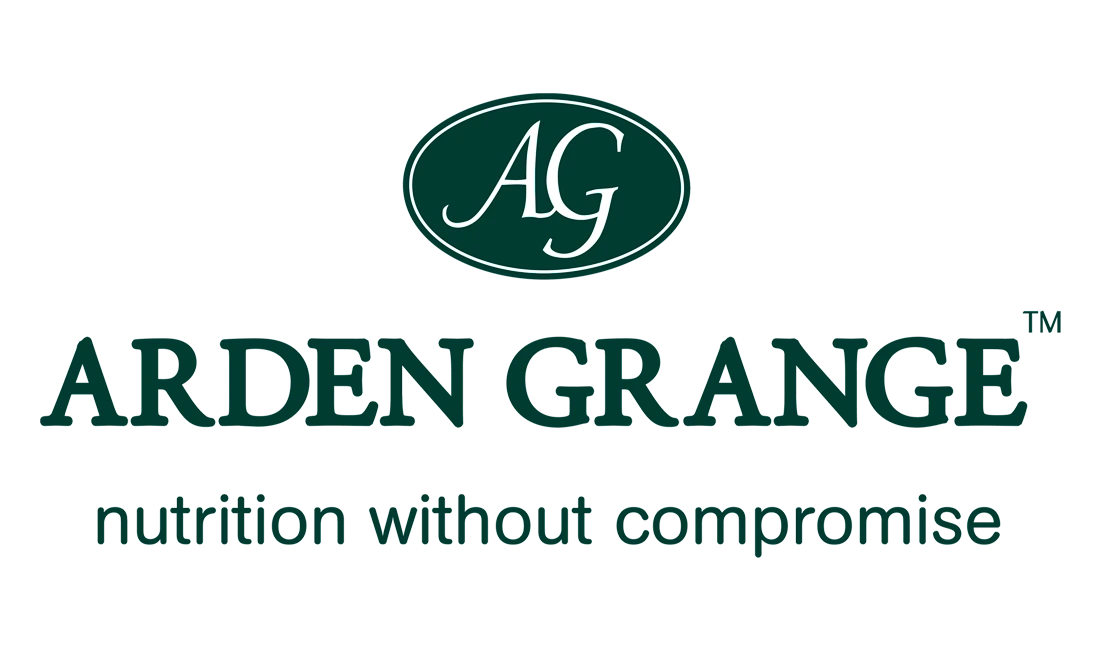Feline nutrition
As carnivores, cats have a high requirement for protein. The Arden Grange feline range includes a high quality meat or fish source as the primary ingredient in every product (as well as egg, krill and additional taurine) to provide all of the necessary amino acids needed to support the structural and metabolic demands of the feline body.
Amino acids are the ‘building blocks’ of protein. Cats are unable to synthesise enough taurine and arginine, and are reliant upon a diet that contains these essential nutrients. Taurine has many roles, and is necessary for a healthy heart and eyes as well as many other functions. Arginine is needed to break down ammonia, which is a waste product.
Unlike dogs, cats cannot manufacture arachidonic acid, which is necessary for efficient immunity, regulation of skin growth, coagulation of the blood and optimal gastrointestinal and reproductive functioning. Arachidonic acid is present in animal fats, and therefore we use chicken oil as the primary fat source. Krill is also included in our dry foods, which is an excellent source of omega-3 EPA and DHA with many benefits to feline health.
Cats also have a requirement for pre-formed vitamin A (present only in foods of animal origin) because they cannot convert beta-carotene to vitamin A. Deficiencies of vitamin A are rare, but serious, and can cause underdevelopment and poor skin and coat condition. Feeding a complete and balanced diet such as Arden Grange means that every vitamin and mineral is present at the correct level for optimum health and vitality.
The high proportion of chicken or white fish is appealing to felines, whose taste buds are finely attuned to umami (meaty/savoury) flavours. The shape, size and density of our dry food is designed to be easily eaten and provide a texture when dry that cats enjoy, although the Arden Grange products may be soaked for up to thirty minutes for cats who prefer a moist texture (providing any uneaten food is discarded to avoid it attracting flies or drying out into an unpalatable, sticky consistency).
All of our cat food products contain cranberry extract to promote a healthy urinary tract, natural pea fibres which may help promote good oral health and also minimise fur-balls, prebiotics for digestive support, and nucleotides to promote optimal digestion and efficient immunity. They also contain glucosamine, chondroitin and MSM for healthy joints.
All of our products are hypoallergenic, and made to recipes that include no grains, beef, soya or dairy products. They are preserved naturally with mixed tocopherols (vitamin E).
Q: At what age do I change my kitten onto an adult food?
A: We suggest that your kitten progresses to an adult variety once he or she is fully-grown, which is usually between 6-12 months of age. This can vary, and is dependent upon the individual’s genetics, growth rate and metabolism. Neutering is usually carried out at around six months of age (unless you intend to breed), and we do not recommend a dietary change around this stressful time. Once your cat has fully recovered after the anaesthetic and surgery, adult food may then be gradually introduced, because hormonal changes after neutering can increase the appetite and decrease the metabolic rate. Kittens that are growing too quickly or putting on weight may benefit from an earlier transition to a lower calorie adult diet. Late developers can remain on kitten food until they are fully grown. Cats with a low appetite may benefit from the Kitten food due to its higher calorie content.
Q: Why is the Arden Grange feline range limited compared to the canine range?
A: This is because dog breeds come in a much wider size range. Canine lifestyles and activity levels also vary hugely. We do not produce specific dental care or fur-ball diets because every product is formulated to support the teeth, coat and digestion.
Q: Can I add fresh meat or fish to the Arden Grange cat food?
A: A small amount of fresh meat or fish as a special treat is unlikely to cause problems, but do not feed too much liver as this can cause vitamin A toxicity. Raw fish fed in excess can cause problems as it contains thiaminases which are enzymes that breakdown thiamine (vitamin B1). Excessive oily fish such as tinned sardines can result in vitamin E deficiency as the body consumes increased levels of the vitamin for protection against oxidative stress. Sticking mostly to a complete and balanced commercial diet reduces the risk of nutrient excesses or deficiencies. If you do add any extras, even in moderation, the main diet should be reduced to allow for those additional calories.
Q: Can Arden Grange products be fed to cats with feline lower urinary tract disease (FLUTD) or struvite crystals?
A: The cranberries in the Arden Grange products contain D-mannose and hippuric acid, which prevent harmful bacteria from sticking to the mucosal walls. They also contain arbutin, which is effective against certain bacteria and fungi, including Candida. The antioxidant and antiviral properties of cranberries further illustrate the versatility of this small but valuable fruit. Limitation of these harmful organisms may lower the risk of conditions such as cystitis. The high meat or fish content of the products may help to promote a slightly acidic urinary pH, which could reduce the risk of struvite crystals since their preferred environment is alkaline urine. The controlled magnesium levels may also be beneficial. Increasing your cat’s fluid intake, ensuring your cat remains at a healthy weight and encouraging an active life-style may all reduce the risk of urinary tract problems. Please note that the Arden Grange products are not formulated to dissolve urinary crystals, and are therefore not generally suitable for cats with an ongoing condition of this nature.
Q: Are Arden Grange products suitable for a cat with sensitive skin or sensitive digestion?
A: Sensitive cats may benefit from a hypoallergenic diet. Wheat, dairy products, beef and soya are some of the more common triggers of adverse food reactions and are therefore not included in the Arden Grange products. The recipes are free from artificial colourings, flavourings and preservatives, which might provoke reactions in very sensitive animals. Prebiotics are included to promote the growth of beneficial intestinal flora, limit the growth of pathogenic bacteria, enhance immunity within the gastrointestinal tract and improve the utilisation of the nutrients. Arden Grange cat foods also contain nucleotides, which increase the surface area for intestinal absorption and facilitate a quicker immune cell response when necessary. Check the ingredients listing carefully if your cat suffers from a food allergy or dietary intolerance because cats can be allergic to any protein source (unless it has been hydrolysed like our chicken digest) or intolerance to any ingredient. Hydrolysed proteins, like our chicken digest, are broken down into tiny fractions of a very low molecular weight that are too small to provoke an adverse immune response. In general terms, our foods are often very well suited to cats with sensitive skin or a sensitive digestion, but individual needs should always be taken into account.
Q: Why doesn’t Arden Grange produce “senior” or “neutered” cat food?
A: The main difference between these products and regular adult diets are that they are lower calorie, ideal for when cats start slowing down and expending less energy, or when neutering decreases the metabolic rate and increases appetite. The Arden Grange Light with chicken & potato is often very suitable for the older or neutered cat, as well as for those whose are weight watching.


 Puppy
Puppy
 Adult
Adult
 Senior
Senior
 Sensitive
Sensitive
 Treats
Treats Kitten
Kitten
 Adult
Adult
 Senior
Senior
 Trusted British Brand
Trusted British Brand

